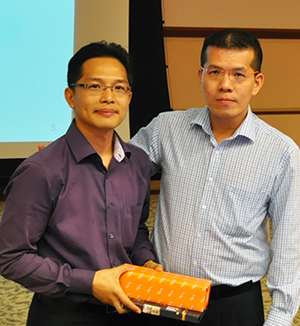Andy Wang, ISS alumnus and Vice President of Enterprise Architecture at OCBC, imparts valuable advice for those considering an NUS-ISS Master of Technology in Software Engineering.

Andy Wang (left) with Tan Eng Tsze, IT Strategy & Management, NUS-ISS
It is not difficult to see Andy’s passion for technology. The NUS-ISS Master of Technology alumnus (Class of 2007) and Vice President of Enterprise Architecture at Overseas Chinese Banking Corporation (OCBC) was a homecoming guest at ISS' 7th Architecture Community of Practice (ACoP) Forum, where he spoke about creating foundations in technology architecture for business agility and growth.
An IT veteran with 13 years under his belt, Andy started out as an IT Architect in NCS, where he garnered multiple awards for contributions. He was also a Programme Architect at Barclays Capital prior to his current role.
Q. Tell us more about your work at OCBC.
I am currently with the technology architecture team of OCBC Bank's Group Operations & Technology division. My key responsibilities include:
- Formulating technology strategies (what we want to do) and roadmaps (how we achieve what we want to do) based on the bank's business strategy to best meet its current and future technology needs in an efficient and effective manner.
- Recommending future technology capabilities and architecture design based on the technology strategy as well as individual business units' objectives, technology trends and prevailing regulatory requirements.
- Developing IT architecture standards and policies based on the bank's needs, regulatory requirements and anticipated technology trends to ensure that it is in the best position to take advantage of technology in delivering business value.
Q. Do you think the Master of Technology (Software Engineering) has helped you in your role?
The Master of Technology (Software Engineering) programme from NUS-ISS has given me first-hand insights on how technology can be used as a strategic value driver for any business. It has a good mix of modules focusing on both technology and management topics, which has improved my ability to analyse things from both perspectives so as to determine the optimal approach for the organisation.
Q. Looking back, which module did you like best and why?
I find the "Software Entrepreneurship" module particularly interesting and relevant. IT has evolved from being a business enabler to a business differentiator, and the ability to view IT solutions from a business value perspective is a great skillset to possess. The module has taught me the importance of incorporating business value and perspectives into initiatives that are presented to the business units.
Q. What triggered the decision to enrol for the programme?
It was the curriculum that piqued my interest, as it included both theoretical and practical learning. In addition, doing a Master programme with NUS-ISS, a leader in the field of Information Technology, is definitely a plus point.
Q. So did the experience live up to your expectations?
I made it a point to constantly upgrade myself via certifications and NUS-ISS is my primary choice. The time I spent at ISS has been truly enriching. I not only gained IT domain knowledge but also honed my discussion, presentation and project management skills.
Q. How would you advise your juniors who are looking to go into Enterprise Architecture?
Essentially, Enterprise Architecture must deliver business value to the organisation. So for those who are keen to go into this field, it's important to view things from a business perspective. Learn to articulate complex technology matters simply and in a manner that business folks can relate to. Be clear about business processes and how technology can be used as a game changer or differentiator for your company.
It's also important to keep your technical skills relevant. I believe that we technology folks should never lose our technical skills as we progress with our careers.
ISS offers Master of Technology (MTech) degrees in Software Engineering (SE), Knowledge Engineering (KE) and Enterprise Business Analytics (EBAC). Each programme leads to the award of a Masters Degree by the National University of Singapore.
Each programme extends over a minimum period of two-and-a-half years, and a maximum of five years for part-time study. The programmes are also available on a full-time basis over a minimum of one-and-a-half years. The Master of Technology programme commences in January each year.
For more information on the Master of Technology programmes, please visit
/graduate-programmes.
This article is first published in NUS-ISS quarterly e-newsletter, Issue 6 (Apr-Jun 2014).